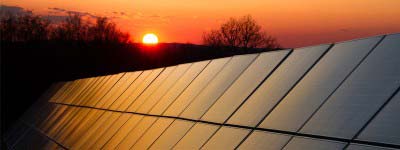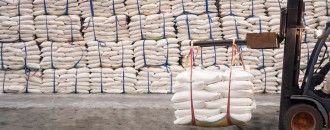
Anti-dumping duty on solar modules will be a big mistake: N. Surana
Interview by Jayashankar Menon | @TheDollarBiz
 Solar project costs could increase by 50-60% if anti-dumping duties are imposed, says Surana
Solar project costs could increase by 50-60% if anti-dumping duties are imposed, says SuranaThe Indian government is considering the recommendations of the Directorate General of Anti-dumping and Allied Duties (DGAD) to introduce anti-dumping duties on imported solar modules from countries like China, USA, Malaysia and Taiwan.However, Narender Surana, Managing Director of Hyderabad-based Surana Ventures Limited, in an exclusive interview with The Dollar Business, says that such protectionist measures are myopic and might prove to be disastrous for India’s solar programme. Excerpts: TDB: As per some reports, twenty foreign companies sold solar modules/cells in India at half of what they sold at home. What is your view on this alleged dumping? NS: Such reports are totally wrong. Modules are sold by all companies across the world at nearly the same price of around $0.60/Watt Peak (WP) to $0.65/WP. This is irrespective of the origin be it in South Korea, Singapore, Taiwan or Malaysia. We are surprised at such baseless findings. We have the quotation from manufacturers of each of these countries where the price is within $0.60/WP to 0.65/WP. TDB: USA and Europe have imposed anti-dumping duties on solar modules/cells and solar glass imports, while China has imposed anti-dumping on polysilicon imports. What do you think is the reason for this? NS: USA and EU have imposed anti-dumping duties on China because cost of manufacturing in EU and USA are 35-40% more than the selling price in China. However, the selling price is nearly the same in Taiwan and Korea and we have the quotation for the same from these countries. Anti-dumping duty has been imposed mainly to protect the companies in USA and EU against Chinese firms. However, countries like India, Singapore and Korea are exporting at nearly the same price as China to EU and USA. TDB: India has, in the pipeline, solar projects with a total capacity of over 1 GW. What will be the impact on these projects if India imposes anti-dumping duty on solar imports? NS: If anti-dumping duty is immediately imposed, several projects will not see the light of day as the project cost would go up by 50-60%. It would be prudent that the government does not impose any anti-dumping duty on the four countries: China, USA, Malaysia and Taiwan, and jeopardise the entire solar energy programme of our Prime Minister Narendra Modi and the encouragement that he has been providing to the solar sector.
 Narender Surana, Managing Director, Surana Ventures Ltd.
Narender Surana, Managing Director, Surana Ventures Ltd.TDB: What will be the likely impact on other national and state solar programmes? NS: The entire solar programme will be in jeopardy. If anti-dumping measures are imposed, state governments are likely to discard the use of solar power at every level as the cost will increase sharply. TDB: But such measures are taken to help the local economy. Isn’t it? NS: It is a wrong to assume that the domestic market will be encouraged. If anti-dumping duty is imposed, India would start importing in bulk from Asian countries, especially, Singapore and Korea at a price which is 20-25% more, as the companies in these countries cannot meet the demand and will increase prices for Indian customers. This would lead to imports from USA as it will be cheaper compared to prices in the local market even after anti-dumping duty on companies such as First Solar. In fact, First Solar has been offering thin film modules at $ 0.52/WP which is lower than the Chinese price and much lower than cost of production in India. However, First Solar products are not accepted in India and some other countries due to the usage of chemicals such as Cadmium, which are used to produce thin film modules. TDB: Why is the demand for anti-dumping duty on solar module imports growing? NS: Actually, all project developers and most of the solar module manufacturers in India are against anti-dumping duty. This is because cell manufacturers have formed a cartel and have increased the price by over 40%. All the solar power projects will become unviable if this continues. TDB: How much would solar energy cost if Indian developers use only domestically produced solar gears? NS: The cost of solar energy will go up by at least 75%, if we were to use Indian produced solar cells/modules. TDB: Some bidders in the Domestic Content Requirement (DCR) category of Jawaharlal Nehru National Solar Mission (JNNSM) Phase II say that domestic manufacturers have formed a cartel and have increased prices thus making their bids unviable. Some others say that the quality/bankability issues discourage them from buying local solar modules. Which of these claims is true? NS: It is true that solar cell manufacturers in India have found a DCR category and are demanding 50-60% price hike over prices quoted by companies in Singapore, Korea and China. It is virtually the DCR content in JNNSM Phase II which is giving license to the Indian cell manufacturers to make money even if the country, as a whole, loses. TDB: What is your recommendation to the Government of India? NS: Our submission to the Government of India is that there should be no anti-dumping duty on imports of solar modules, as China, Taiwan, Malaysia and USA are selling this product at cost plus basis today. However, since the cost of production has come down, the solar power generation companies set up in India should take maximum advantage of the prevalent price to generate solar power at every village and town.






 to success.
to success.